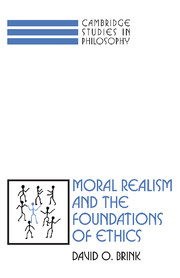Book contents
- Frontmatter
- Contents
- Preface
- 1 INTRODUCTION
- 2 MORAL REALISM AND MORAL INQUIRY
- 3 EXTERNALIST MORAL REALISM
- 4 DOES MORAL REALISM MATTER?
- 5 A COHERENTIST MORAL EPISTEMOLOGY
- 6 MORAL REALISM AND THE IS/OUGHT THESIS
- 7 A POSTERIORI OBJECTIONS TO MORAL REALISM
- 8 OBJECTIVE UTILITARIANISM
- Appendix 1 Must an infinite regress of justification be vicious?
- Appendix 2 Coherence, internalism, and externalism in epistemology
- Appendix 3 The is/ought thesis and intuitionism
- Appendix 4 Rawlsian constructivism
- Bibliography
- Index
7 - A POSTERIORI OBJECTIONS TO MORAL REALISM
Published online by Cambridge University Press: 11 January 2010
- Frontmatter
- Contents
- Preface
- 1 INTRODUCTION
- 2 MORAL REALISM AND MORAL INQUIRY
- 3 EXTERNALIST MORAL REALISM
- 4 DOES MORAL REALISM MATTER?
- 5 A COHERENTIST MORAL EPISTEMOLOGY
- 6 MORAL REALISM AND THE IS/OUGHT THESIS
- 7 A POSTERIORI OBJECTIONS TO MORAL REALISM
- 8 OBJECTIVE UTILITARIANISM
- Appendix 1 Must an infinite regress of justification be vicious?
- Appendix 2 Coherence, internalism, and externalism in epistemology
- Appendix 3 The is/ought thesis and intuitionism
- Appendix 4 Rawlsian constructivism
- Bibliography
- Index
Summary
My case for moral realism depends on coherentism and the plausibility of belief in moral realism itself and in the reliability of considered moral beliefs. Chapter 6 considered rebuttals to these metaphysical and epistemological claims based on the existence of an is/ought gap. My main concern in that chapter was to defend the intelligibility of the realist's metaphysical and epistemological claims against certain attacks. But even if moral realism makes intelligible metaphysical and epistemological claims that are initially plausible, there may nonetheless be good empirical reasons for rejecting these claims. In this chapter I consider a posteriori rebuttals to my case for moral realism. There are two kinds of argument I shall consider: one metaphysical, one epistemological. Although there have been many proponents of both kinds of argument, we can focus discussion by considering recent and perspicuous formulations of these arguments by J. L. Mackie (1977: chap. 1) and Gilbert Harman (1977: 3–23). Mackie's metaphysical argument claims that the moral realist's account of moral facts and properties, though intelligible, is queer or mysterious compared to the metaphysical commitments of recognizably realist disciplines such as the natural or social sciences. His epistemological argument claims there is no plausible methodology or theory of justification that a moral realist can hold. In particular, Mackie thinks that there are good a posteriori objections to intuitionism, and although he does not, we can construct a posteriori objections to a coherence theory of justification in ethics by appeal to Harman's argument for the observational immunity of moral theories and Mackie's argument from moral relativity or diversity.
- Type
- Chapter
- Information
- Moral Realism and the Foundations of Ethics , pp. 171 - 210Publisher: Cambridge University PressPrint publication year: 1989



